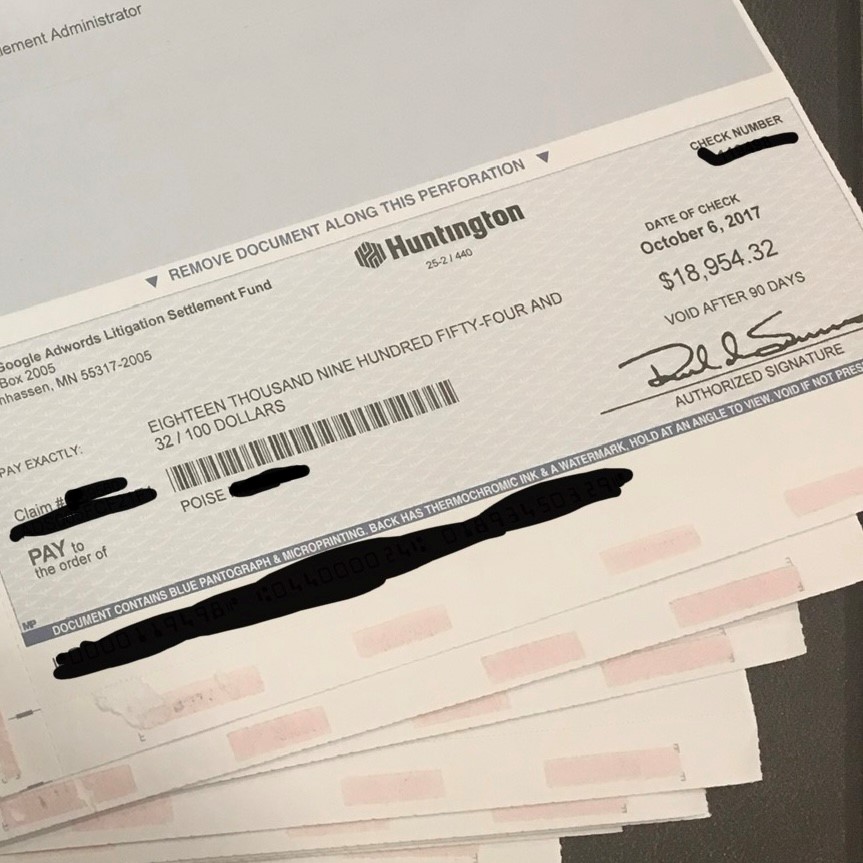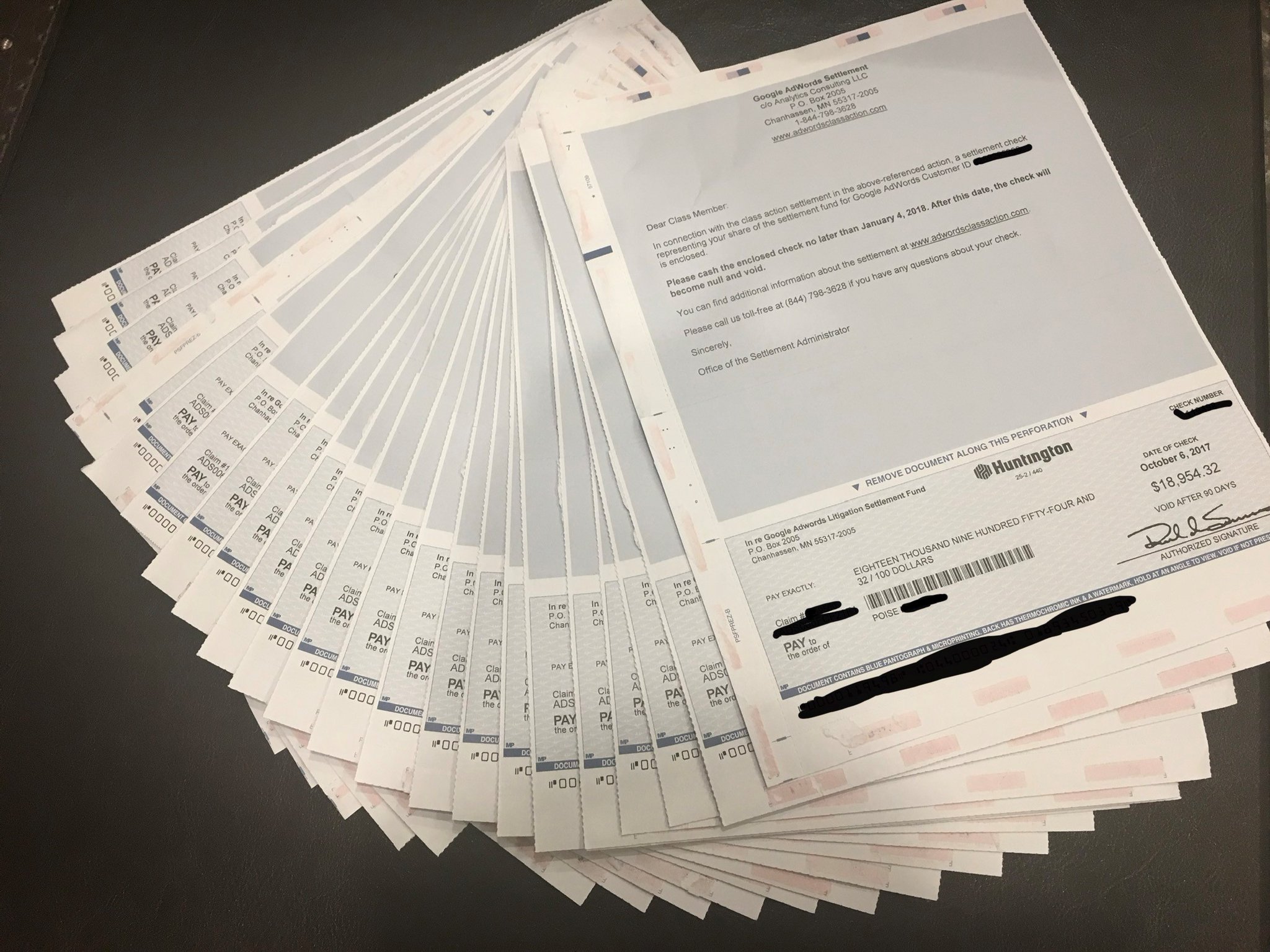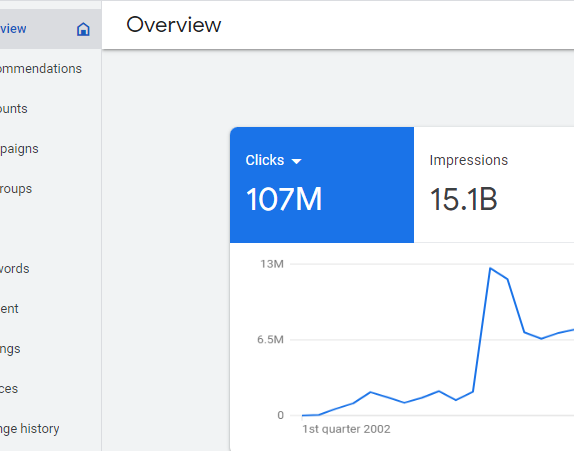Thread
At 19 I built a digital advertising business that made me over $30 million in profit in a few years.
I was the only employee.
At one point, I was Google’s 2nd largest advertiser after eBay.
Here’s the story of how it happened, what the business did, and how much $ it made.
I was the only employee.
At one point, I was Google’s 2nd largest advertiser after eBay.
Here’s the story of how it happened, what the business did, and how much $ it made.
A few years ago a stack of envelopes w/checks arrived on my bday. They were class action settlement checks. They were remnants of my first big hustle.
The business was performance marketing. I used paid search to execute it. That combo just crushed it.
The business was performance marketing. I used paid search to execute it. That combo just crushed it.
The way it worked was, I’d get paid to drive customers to an advertiser. I figured out that search advertising was extremely targeted for any kind of customer. All I had to do is spend less per click than what I was effectively generating in bounties to acquire a customer.
For example, The New York Times paid me like $100 for every new subscriber I sign-up. Say I pay 50 cents a click, and on average I get a conversion for every 80 clicks. That means for every $40 I spent on ads, I’d get $100 from NYT.
I started doing this in 2001.
It was wildly profitable.
I was 19. My family moved from the former Soviet Union when I was 11. I only got my first computer at 17. Loved finance, computers and marketing.
It was wildly profitable.
I was 19. My family moved from the former Soviet Union when I was 11. I only got my first computer at 17. Loved finance, computers and marketing.
And because the web was so new, big companies didn’t really know how to do online marketing.
Neither did I, frankly, but I figured it out.
Neither did I, frankly, but I figured it out.
Paid search was new. Pre-Google.
I saw that in 2001 brands would pay per customer, and you don't need to win a huge contract or go through a crazy process to be a vendor.
I saw that in 2001 brands would pay per customer, and you don't need to win a huge contract or go through a crazy process to be a vendor.
All you do is apply to their affiliate program, get approved and test their deals. I grabbed a deal and gave it a shot.
The first deal was driving customers to a marketplace called Half (later acquired by eBay).
They sold used DVDs, college textbooks, CDs and video games.
I opened a GoTo account (GoTo later became Yahoo Paid Search) and started to drive traffic to Half.
They sold used DVDs, college textbooks, CDs and video games.
I opened a GoTo account (GoTo later became Yahoo Paid Search) and started to drive traffic to Half.
There weren’t budget caps back then. I set up the campaigns, turned them on, and went to sleep.
I woke up to a $5,000 loss.
Did I just lose a month's worth of income in my sleep? Yes you did Val.
I spent $6k on ads for $1k of revenue. Ouch.
I woke up to a $5,000 loss.
Did I just lose a month's worth of income in my sleep? Yes you did Val.
I spent $6k on ads for $1k of revenue. Ouch.
A loss, but my gut told me there is something there.
I researched each and every keyword. Separated by categories and landing pages they had. Deep linked what I can. Optimized the bids. Boosted the winners. Drop the losers.
Then it became profitable.
I researched each and every keyword. Separated by categories and landing pages they had. Deep linked what I can. Optimized the bids. Boosted the winners. Drop the losers.
Then it became profitable.
Pretty soon it started to make $1k/day.
When it worked for Half, I tried more products.
Specifically, 800 different advertisers. Yes, I launched 800 other brands and products on search.
When it worked for Half, I tried more products.
Specifically, 800 different advertisers. Yes, I launched 800 other brands and products on search.
Most of these deals could be found on affiliate networks, such as Commission Junction, AzoogleAds (RIP), and others.
Having just a few networks saved me a lot of time, because they tracked everything, collected the earnings, and paid me.
Having just a few networks saved me a lot of time, because they tracked everything, collected the earnings, and paid me.
I even had a negative cash flow! To win my business, networks started to pay me like Net 3, Net 7 terms. I only had to pay for the ads on Net 30. So I’d get paid before the ads had to be paid for. My cash flow statement was beautiful.
Plus, their account managers started to sling all the best deals to me because they knew I was one reliable beast. I’d make them look good to their new advertisers.
And it worked across pretty much every category. Subscriptions, lead-gen, ecommerce. It was a small world back then, but there were no limits. The best deals were the ones where the advertiser had a great Lifetime Value, and they’re willing to front-load it to me.
One of my bigger advertisers was Rhapsody Music. I loved the idea of streaming unlimited music legally (believe it or not, it was unheard of back then). So I’d bid on millions of keywords. Every song, every artist. The long tail was looooong.
I worked insane hours. Going to sleep when I saw the sunrise and the birds singing. Automating processes and using bulk tools was key.
I just kept testing 100s of offers to find the best ones. Many didn't work at first but had potential. So I’d email the advertiser directly and negotiate a better deal.
One of the big secrets to this business, and all my other businesses:
I don't waste time on perfecting something for a launch. Launch and see the data, then optimize for success. Or if it fails miserably, it's much easier to take the loss and move on.
This worked for me.
I don't waste time on perfecting something for a launch. Launch and see the data, then optimize for success. Or if it fails miserably, it's much easier to take the loss and move on.
This worked for me.
Then came Google.
Things only got bigger.
Things only got bigger.
At one point a Google employee told me I was their 2nd largest client after eBay. I could never verify it but it was early, and it made sense. It was so early at Google that my rep’s email address was mike@google[.]com (world's most spammed email address?)
The numbers were insane. Just on Google, I drove 107 million clicks to my advertisers. These are not random clicks, they’re high intent clicks from people looking for things that I was advertising.
The volume got so big, advertisers would find me and beg to give them a shot with massive incentives to boot.
Those special rates allowed me to outbid anyone. In fact I’d negotiate non-compete and non-circumvent terms where the brand couldn't compete with me on search.
Those special rates allowed me to outbid anyone. In fact I’d negotiate non-compete and non-circumvent terms where the brand couldn't compete with me on search.
While they paid me 3x, 4x base rate.
Paying me 4x was still more effective than paying their big shot brand agency
Paying me 4x was still more effective than paying their big shot brand agency
The secret nobody knew is that I was a 1-man show.
Very few knew about paid search back then, so I stayed under the radar.
Never went to one trade show. I’d win industry awards, but wouldn't go to the events to collect them. They’d ship the trophies to me. Exposure scared me.
Very few knew about paid search back then, so I stayed under the radar.
Never went to one trade show. I’d win industry awards, but wouldn't go to the events to collect them. They’d ship the trophies to me. Exposure scared me.
My reps would tell me that Poise is doing as much volume as the other biggest player.
One was @VinnyLingham’s performance marketing agency. I believe it had like 100 employees out of South Africa and they were crushing it as well.
One was @VinnyLingham’s performance marketing agency. I believe it had like 100 employees out of South Africa and they were crushing it as well.
My first year’s profit was around $1.5M
That was a lot of dough for a 19 year old immigrant in 2001. My parents couldn't even afford to buy me a PC until I was 17. (Yeah, if you did the math, that’s just 2 years ago)
That was a lot of dough for a 19 year old immigrant in 2001. My parents couldn't even afford to buy me a PC until I was 17. (Yeah, if you did the math, that’s just 2 years ago)
I was making so much money, the taxes were killing me in Queens, NYC. It was time to move out of my parents basement. So I moved to the suburbs of Long Island. Bought a house, all cash, and the neighbors thought I had to be a drug dealer.
You’re thinking he bought a mansion. No, it was a relatively modest suburban home. In fact the house cost me like a month’s worth of profits at the time. I needed to focus on the business, not maintenance of a house.
But the profit only kept going higher and higher. Every year I thought there is no way I’d beat last year’s number, but it’d just grow.
I didn’t even track it, just kept pushing hard, not realizing how far the profit was intra-year. It’s like that inspiration scene from Facing The Giants. I had blinders on and kept crawling away. www.youtube.com/watch?v=fsaKwDPBTeM
I had no finance department or employees. Just wanted to test more, win more.
The $ didn’t matter, it was the game and I walked away with a $30M prize.
Why walk?
The $ didn’t matter, it was the game and I walked away with a $30M prize.
Why walk?
Because I had a choice to make. Commit or walk. Committing meant hiring employees, offices, all while margins were sliding as paid search was becoming the biggest category of digital advertising. Google would be my biggest supplier by far, and they'd control my business.
Plus I tested a new formula that worked.
So I put search on cruise control and went after a new opportunity. It would become my 2nd company.
This time the first year's profit was over $10M.
So I put search on cruise control and went after a new opportunity. It would become my 2nd company.
This time the first year's profit was over $10M.
Give me a follow and let me know if you want to hear how I monopolized a small corner of the music industry with my 2nd company.
Maybe I'll share stories about several other businesses I've founded too.
Thx to @SamParr for helping me with this thread, and thx for reading!
Maybe I'll share stories about several other businesses I've founded too.
Thx to @SamParr for helping me with this thread, and thx for reading!
Correction....thx goes to @theSamParr (can't fix the wrong handle in original post)
Surprised nobody noticed another mistake. Instead of "I even had a negative cash flow!" meant to say "negative working capital"! Negative cash flow is no good 🤪. Negative working capital is what made Amazon what it is. More business you do, more other people's cash you float.
Mentions
See All
Joe Pompliano @JoePompliano
·
Jan 5, 2022
This was an epic thread


